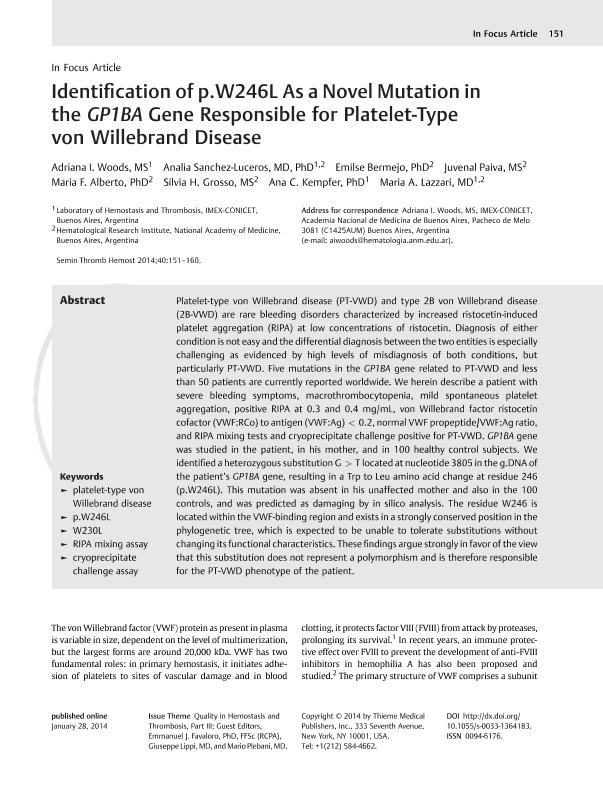Artículo
Identification of p.W246L As a Novel Mutation in the GP1BA Gene Responsible for Platelet-Type von Willebrand Disease
Woods, Adriana Inés ; Sánchez Luceros, Analía Gabriela
; Sánchez Luceros, Analía Gabriela ; Bermejo, Emilse; Paiva, Juvenal; Alberto, Maria Fabiana; Grosso, Silvia H.; Kempfer, Ana Catalina
; Bermejo, Emilse; Paiva, Juvenal; Alberto, Maria Fabiana; Grosso, Silvia H.; Kempfer, Ana Catalina ; Lazzari, María Ángela
; Lazzari, María Ángela
 ; Sánchez Luceros, Analía Gabriela
; Sánchez Luceros, Analía Gabriela ; Bermejo, Emilse; Paiva, Juvenal; Alberto, Maria Fabiana; Grosso, Silvia H.; Kempfer, Ana Catalina
; Bermejo, Emilse; Paiva, Juvenal; Alberto, Maria Fabiana; Grosso, Silvia H.; Kempfer, Ana Catalina ; Lazzari, María Ángela
; Lazzari, María Ángela
Fecha de publicación:
01/2014
Editorial:
Thieme Medical Publ Inc
Revista:
Seminars In Thrombosis And Hemostasis
ISSN:
0094-6176
Idioma:
Inglés
Tipo de recurso:
Artículo publicado
Clasificación temática:
Resumen
Platelet-type von Willebrand disease (PT-VWD) and type 2B von Willebrand disease (2B-VWD) are rare bleeding disorders characterized by increased ristocetin-induced platelet aggregation (RIPA) at low concentrations of ristocetin. Diagnosis of either condition is not easy and the differential diagnosis between the two entities is especially challenging as evidenced by high levels of misdiagnosis of both conditions, but particularly PT-VWD. Five mutations in the GP1BA gene related to PT-VWD and less than 50 patients are currently reported worldwide. We herein describe a patient with severe bleeding symptoms, macrothrombocytopenia, mild spontaneous platelet aggregation, positive RIPA at 0.3 and 0.4 mg/mL, von Willebrand factor ristocetin cofactor (VWF:RCo) to antigen (VWF:Ag) < 0.2, normal VWF propeptide/VWF:Ag ratio, and RIPA mixing tests and cryoprecipitate challenge positive for PT-VWD. GP1BA gene was studied in the patient, in his mother, and in 100 healthy control subjects. We identified a heterozygous substitution G > T located at nucleotide 3805 in the g.DNA of the patient's GP1BA gene, resulting in a Trp to Leu amino acid change at residue 246 (p.W246L). This mutation was absent in his unaffected mother and also in the 100 controls, and was predicted as damaging by in silico analysis. The residue W246 is located within the VWF-binding region and exists in a strongly conserved position in the phylogenetic tree, which is expected to be unable to tolerate substitutions without changing its functional characteristics. These findings argue strongly in favor of the view that this substitution does not represent a polymorphism and is therefore responsible for the PT-VWD phenotype of the patient
Archivos asociados
Licencia
Identificadores
Colecciones
Articulos(IMEX)
Articulos de INST.DE MEDICINA EXPERIMENTAL
Articulos de INST.DE MEDICINA EXPERIMENTAL
Citación
Woods, Adriana Inés; Sánchez Luceros, Analía Gabriela; Bermejo, Emilse; Paiva, Juvenal; Alberto, Maria Fabiana; et al.; Identification of p.W246L As a Novel Mutation in the GP1BA Gene Responsible for Platelet-Type von Willebrand Disease; Thieme Medical Publ Inc; Seminars In Thrombosis And Hemostasis; 40; 2; 1-2014; 151-160
Compartir
Altmétricas



